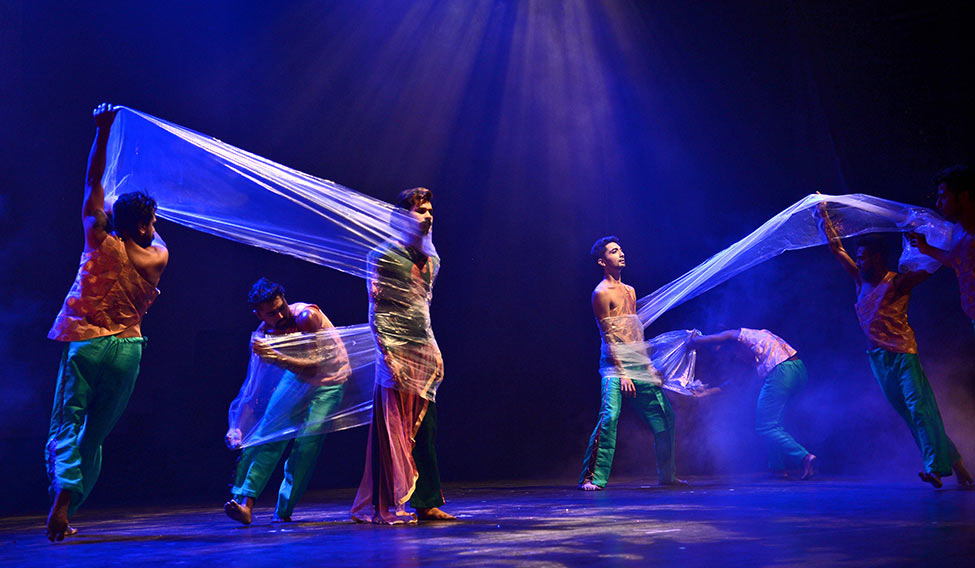I heard my name called from behind. When I turned, I saw a transgender woman in a pair of tight jeans and a solemn T-shirt that seemed to hide her colourful personality. But her laughter, as I would learn later, was even more colourful—a swift and sudden gallop that pulled you into a contagious ride. I’d been in touch with Vyjayanti Vasanta Mogli over the past week for this story. She took me to another transgender woman, Sabi Giri, lolling on the sofa of the hotel lobby in Hyderabad. Sabi was the quieter of the two but had a playful side to her that one had to tease out, like getting a shy child to talk. Both of them were in a distraught state.
They told me they were sexually harassed by a man the previous evening as they stepped out to buy some medicines for Vyjayanti’s terminally-ill father. When he followed them home, Vyjayanti threatened to call the police and took down the registration number of his bike. That’s when he finally left.
“Does this kind of thing happen often?” I asked them.
“Yes,” Vyjayanti told me. “But I got scared that he now knew where I lived.”
In the evening, she told me, they would go to the police station to file a complaint against the man. But before that, we had another destination—one of the dozens of communes in Telangana where transgender women lived in the matrilineal set-up that was prevalent in some form all over the country. Transgender groups are known by different names in different parts of the country—hijra in the north, shiv-shakti and kojja in Andhra Pradesh, thirunangai in Tamil Nadu and mangalmukhi in the border regions of Karnataka, Maharashtra and Telangana. The guru-chela system is the age-old family system of these women aimed to protect and unite them. So, a number of chelas or transgender women would be under the guardianship of one guru.
The guru at the commune that we visited, Mona Lisa, or Mona Mummy as she was affectionately called, was one of the most progressive gurus of Telangana. She had recently partnered with the ministry of rural development to organise a gathering of 500 people and raise awareness of transgender issues. She was working hard to enable transgender women to start small businesses of honeybee rearing, agarbatti making and solar power production to get out of sex work and begging.
 On December 19, Tiffany Abreu became the first transgender player in Brazil’s top volleyball tournament Superniga | AP
On December 19, Tiffany Abreu became the first transgender player in Brazil’s top volleyball tournament Superniga | AP
We climbed up a narrow staircase, past a balcony overlooking a small temple, to a door with a brass knob. Mona Mummy, a stout woman in a nightie wearing a heavy gold chain and a gold bangle, opened the door. I was surprised, and a bit rattled, to be enfolded in a bear hug by her. She was like a mother hen, always clucking about, feeding us vada and wanting to make sure we were comfortable.
“Do you like chicken curry?” she asked.
I nodded, not sure where this was leading. After a while, she sat cross-legged on a straw mat on the floor, plucking out coriander leaves from long strips to make dal fry and chicken curry for lunch. While working, she told us about the lives of the 40 chelas or transgender women under her.
“I had more than 300 chelas under me,” she told us. “But they were taken away from me because I was trying to break the system and rescue these girls from sex work and begging. Most gurus are regressive because they themselves, 20 or 30 years ago, were victims of sexual abuse and gang rape. They have gotten impervious and radicalised. I told them: if we don’t educate and employ the girls, no one is going to give them a backward glance after they turn 50. They will live and die miserable deaths.”
In a way, she seemed to be talking about herself. Despite her efforts, she has not been very successful in integrating with the mainstream. She sent her application to take part in the Swachh Bharat and the toilet campaigns but hasn’t got a reply yet. “I don’t want money,” she said. “I have a team with me. I just want to help.”
In the afternoon, after a sumptuous meal and a session of hugs and selfies (for which Mona Mummy groomed herself and changed into a stately salwar kameez), we left mummy’s house and headed to the police station to register the complaint. The place seemed rather plush for a police station, clean and spacious. A sleepy officer, drumming his fingers on the table, took down our complaint and passed us on to another officer, who took us to another. Finally, a woman inspector led us into a secluded room with two other female constables and asked us to narrate what happened. She seemed to be fascinated by the transgender women and asked them a posse of questions (“not as a police officer but as a woman”) which I thought might be intrusive but which the women answered sportingly. Occasionally, when the constables heard the answers, they would start giggling, like teenage girls discussing their crush.
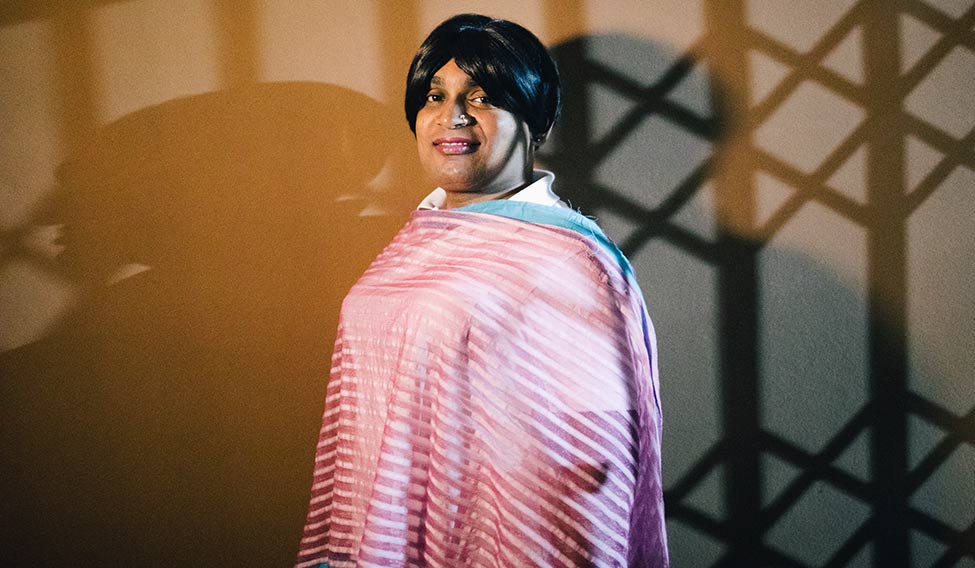 Vyjayanti Vasanta Mogli | Kishor Krishnamurthy
Vyjayanti Vasanta Mogli | Kishor Krishnamurthy
“Is it a wig that you’re wearing?”
“Do you wear bras?”
“How can you have a vagina after surgery?”
“Don’t you want to get married?”
Afterwards, she wanted each of them to tell their stories. When Sabi talked of how she had been dismissed from the Navy after she came out as transgender, the inspector looked genuinely confused. She had a single question.
“Why?”
Why would you want to give up a well-paying job, lose your identity and face discrimination and ridicule, for the sake of changing your gender?
Why indeed?
Sabi had a terse reply.
“Because that’s the way I am.”
***
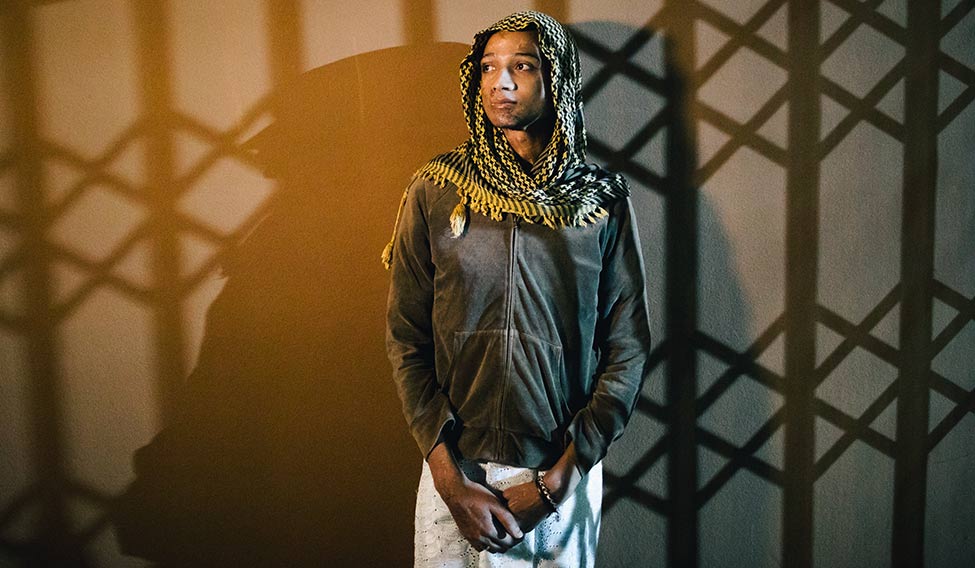 Sonia Sheikh, a transgender acid attack victim | Kishor Krishnamurthy
Sonia Sheikh, a transgender acid attack victim | Kishor Krishnamurthy
Research has shown that there might be some biological basis to gender dysphoria, or identifying with a gender not assigned to you at birth. Transgender people can’t help being who they are. According to the Diagnostic and Statistical Manual (DSM-5) of the American Psychiatric Association, ‘gender dysphoria’ means difficulty to function because of a difference between the gender you identify with and the gender assigned to you at birth. It is mostly prevalent in trans people and often manifests in the form of depression and suicidal tendencies.
In common parlance, the term ‘transgender’ is used to include a diverse potpourri of people—those who identify with the opposite sex; those who feel they are between genders or neither gender (gender queer or gender fluid); those who like to dress as the opposite sex (cross dressers); and those born with intersex conditions (hermaphroditism). As a broad category, Dr Varghese Punnoose, head of the department of psychiatry at Government Medical College, Kottayam, Kerala, defined a transgender status as “a rare situation where the psychological gender does not match with biological sex or the assigned gender at birth”.
Gender dysphoria might take place at the neurological or the chromosomal level. At the neurological level, the brain of transgender people resembles the brain of the gender they identify with. So, for example, the brain of a transgender woman, who was born as a man, would resemble the female brain and not the male brain. “There are structural and physiological differences in the brains of a man and a woman,” said Dr Pradeep Vasudevan, consultant clinical geneticist and honorary professor of genetics at the University of Leicester in the UK. “The volume of the brain is more in men than in women. The amygdala is larger in men and portions of the hippocampus in women. There is more intra-hemispheric connectivity in men and inter-hemispheric connectivity in women.”
This dissonance between your brain, which decides the gender you identify with, and your sexual organs, which decide the gender you’re assigned at birth, might be because sexual differentiation of the genitals and the brain takes place at different times during pregnancy. Thus, they might be subjected to different environments of hormones and genetic factors.
Gender dysphoria might also take place at the chromosomal level, where individuals don’t have secondary sexual characteristics—like breasts and chest hair—congruent with their chromosomal sex. Women have an XX pair of sex chromosomes and men have an XY pair of sex chromosomes. A mutation in a gene might cause a person to look like a woman but have the sex chromosomes of a man, or vice versa. “I’ve seen a person with male secondary sexual characteristics like chest hair and baldness who came to us because his partner was unable to conceive. We examined him to find that he had the sex chromosomes of a woman,” said Vasudevan.
The blurring of the line between genders is best exemplified in people like Delfina, who identify themselves neither as male nor as female. (Delfina preferred that I use the pronoun ‘they’ instead of ‘he’ or ‘she’.) I met Delfina outside ‘their’ home in Chennai. Everything about ‘them’ was delicate—’their’ handshake, ‘their’ walk and ‘their’ voice, which was soft and pillowy, the kind a mother might use to sing her baby to sleep. In ‘their’ flowing pants and girly top, there was something saintly about Delfina. In a small way, ‘they’ resembled a monk who got up in the morning wearing the wrong clothes. Delfina, who was named Vikram Sundarraman at birth, comes from a middle-class family. In one of ‘their’ earliest report cards, a teacher has noted down an observation: “Does not mingle with other boys”. ‘They’ did not like the aggressive games that boys played and preferred the company of girls. The boys thought there was something wrong with Delfina. The bullies spilled ink on Delfina’s shirt and wrote the words ‘foreign dog’ on it. Once, they tried to physically examine ‘them’ to see if Delfina was boy or girl. Another time, they stalked Delfina on ‘their’ way home. They beat ‘them’ and left ‘them’ there by the roadside.
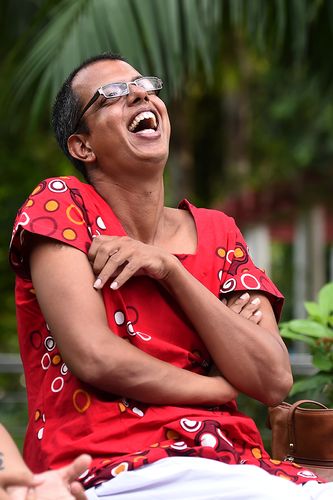 Out of the box: delfina prefers not to be identified as man or woman | R.G. Sasthaa
Out of the box: delfina prefers not to be identified as man or woman | R.G. Sasthaa
Another pastime was listening to international shortwave broadcasting. Delfina did not like mainstream entertainment because most of the programmes on television reinforced stereotypical notions of masculinity and femininity. Shortwave was the way that they could access a different culture through radio stations around the world. “I used to love listening to documentaries from Radio Netherlands on subjects like LGBT rights, sex work and homosexual lifestyles,” Delfina said. “The Netherlands, at that time, was one of the most progressive nations and the first to legalise same-sex marriages. I think this gave me a different cultural understanding and a sort of validation that my way of thinking and perspectives existed elsewhere as well.” ‘They’ spent most of ‘their’ life conforming to gender norms. Only recently did ‘they’ start attaining the confidence to come out as gender fluid.
Gender is a tricky terrain because there are so many people who fall outside strict definitions of ‘man’ and ‘woman’. Namithaa Jayasankar, who puts herself on the transfeminine spectrum of gender, said that gender is something she performs—she doesn’t want to be identified based on a small part of who she is. T.D. Sivakumar, one of the founders of the NGO Nirangal in Chennai, said that his gender is fluid. “Sometimes I feel fully male and at other times, I feel fully female,” he said. Alok Vaid-Menon, a gender nonconforming Indian settled in the US, said he never felt attached to the category ‘boy’. “From a young age, I wore my sister’s clothes and borrowed my mom’s chunis,” he said. “When I started to go to school I was always taunted and bullied for being effeminate. When I found out it was possible to be neither a boy nor a girl I was like: ‘Oh wait, this is me’.” Gowri Savithri, a trans woman from Cherthala, Kerala, believes that both her male body and female mind were given to her by God; so why live in a specific category?
***
Sandra, a 31-year-old trans woman from Kerala, said that she had considered taking her life many times. She used to like dressing up as a girl from a young age. Her mother beat her and her classmates bullied and made fun of her. She used to pray to God to make her a woman just for one day. Twice, she ran away from home. She was in love with a boy who used to extort money from her. “I was desperate for the love that I hadn’t received from my family,” she said. Later, she got work as a home nurse but couldn’t continue as her employers didn’t like her dressing up as a woman. When the money ran out, she got into sex work. There was a spot in Kozhikode where she stood and solicited men. She made up excuses to avoid telling her family where she was going. Still, she didn’t find any acceptance from her loved ones. She comes from a very poor family. Her father has high blood pressure and can’t go out to work. Her mother is a sweeper in a neighbour’s house, and the family largely survives on her income. Her older brother is the most vehement in his disapproval of her. Her family did not even allow her to attend his wedding. She never goes to social functions.
Sandra’s story is not an isolated one. In fact, it is uncanny how almost all the stories of transgender people follow a similar trajectory. Psychiatrist Punnoose says that often society views the transgender community as violent because those who fall within that stereotype are more visible. Many have a strong desire to be the opposite sex and there are mental and psychological mechanisms by which they overdo it and caricature their own appearance. When they lose family support, they go through a lot of psychological distress. Many become addicted to alcohol and drugs. This is a bad combination that drives them to anti-social activities and sex work. Some of them join groups that operate like gangs that are into organised begging and crime. Once you get into it, you become submissive to the hierarchy within.
What they need most are jobs, said Vyjayanti. Only a small percentage of the transgender community is employed. Vyjayanti herself was employed as a man at a multinational corporation. After the NALSA vs Union of India judgment in April 2014 that guaranteed equal rights to transgender people, she came out as transgender. She asked to have access to a ladies’ restroom or at least a gender-neutral one. The request was turned down. Her role in the organisation was changed to one requiring capabilities that, as a dyslexic, she did not have. Despite submitting her dyslexia certificates, the company did not change her job profile. She was asked to resign and was not paid a year’s salary. Only after she quit was it credited to her bank account.
“The company broke the law, discriminated against me based on my gender identity and disability and unlawfully terminated my employment,” she said.
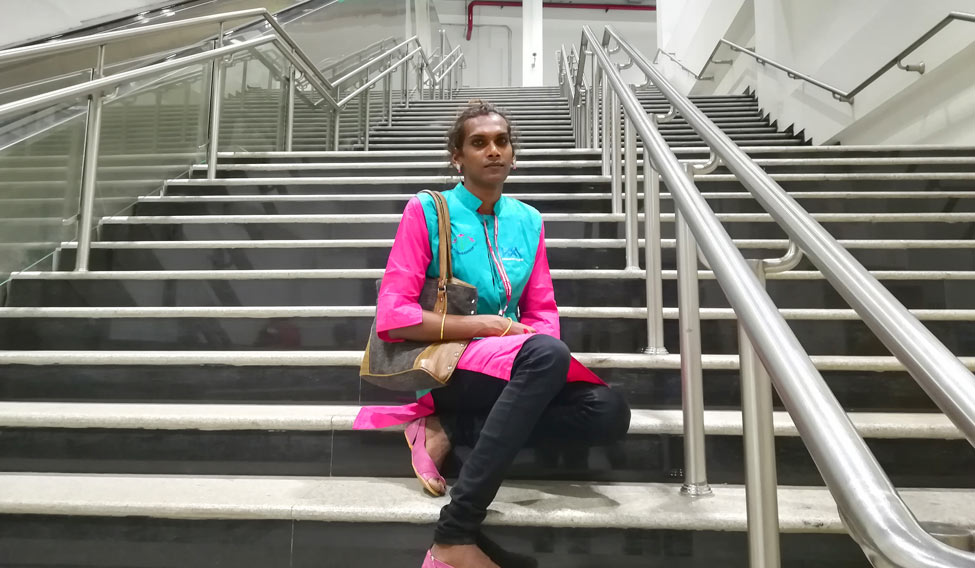 Adhithi Achu, customer facilitation Assistant, Kochi Metro | Vipin Das
Adhithi Achu, customer facilitation Assistant, Kochi Metro | Vipin Das
Without jobs, they are stuck in a rut, she said. Even when they have tried their hand at entrepreneurship and opened beauty parlours or fruit stalls, they did not get customers and were forced to close. “People have a misconception that we make a lot of money through sex work,” she said. “In truth, we lead a hand-to-mouth existence. We spend most of what we earn to buy hormones [to change our appearance] and to do our sex reassignment surgeries. No government hospitals in Telangana do these surgeries and when we go to private hospitals, they make us sign on blank paper to shun responsibility if anything goes wrong. Another problem is trying to get accommodation in the city. This is near impossible and we have to pay twice the rent others pay. Our government IDs list us as male but we look female so we’re denied access to many public utilities. Trying to legally change our gender is a nightmare. I could do it only after running from pillar to post for two and a half years and finally filing a writ of mandamus in the High Court. Government officials are clueless about the issues transgender people face.”
On my last evening in Telangana, I was driven to another commune to meet a transgender woman and an acid attack victim called Sonia Sheikh. She lived with her mother and four sisters in a rented apartment and met the expenses of the family by dancing at events. An admirer started wooing her but she was not interested. He asked her how she, who was not even a proper woman, could reject him. Finally, in May 2015, on the pretext of apologising to her, he kidnapped her and took her to a farmhouse far from the city. There, his friends and he gangraped her, and in the morning they drove her back.
On the way, the man said: “You’re so arrogant because you think you’re beautiful. Let’s see how beautiful you are going to be.” Then he took a petrol can, threw acid on her face and pushed her out of the moving car. She stumbled to a nearby house and could see the shell-shocked expression on the face of the person who opened the door. Then, she fell unconscious. She was taken to a government hospital. She couldn’t close her eyes or open her mouth and was fed semi-solid and liquid food through a straw. One day, a group of government lawyers came to the burns ward as part of the testimony process.
“I couldn’t hear what they said so I asked them to come near but they wanted to keep a distance,” she said. “They asked me to narrate what happened. They kept asking me to repeat the part where I was gang-raped. Then they told me: ‘You’re going to be punished.’ When I asked why, they cited Section 377 of the Indian Penal Code and pointed out that the law forbids those assigned male at birth to have sexual intercourse with other male individuals.”
Although she spoke animatedly, her eyes wore a dull look. Once, when her cell phone rang and the ringtone was a sad, soulful song, Sonia smiled slyly and joked: “There. Now you have the soundtrack to my story.”
Later, something Sonia told me replayed in my mind: “How could I make them understand that I was the victim and not the perpetrator?” She could have been speaking for the whole community.




